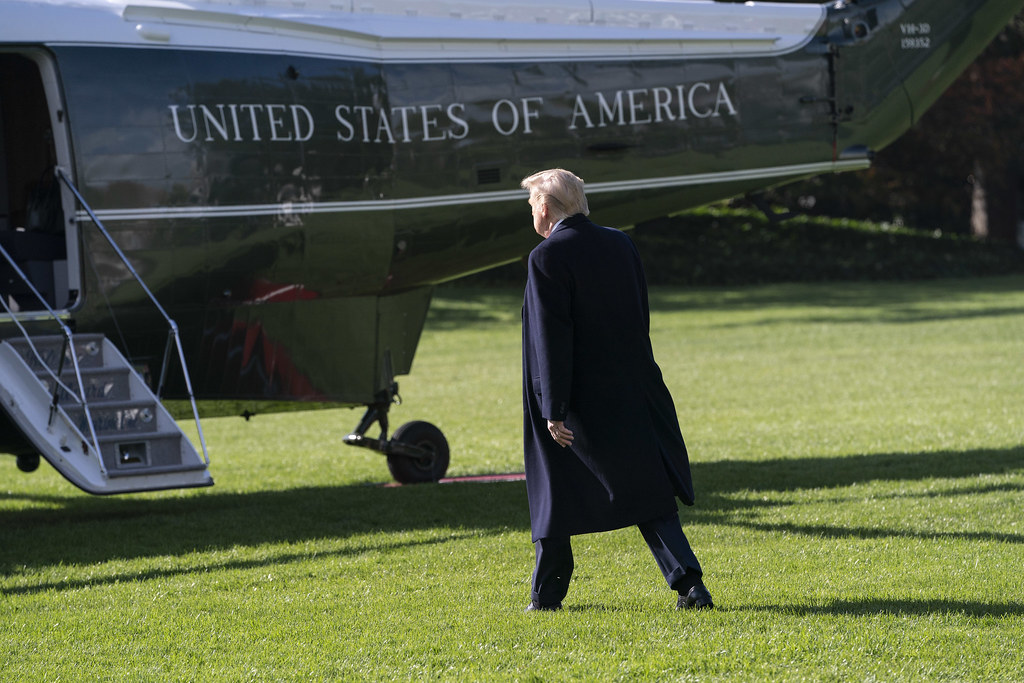Must Impeachable Offenses Be Violations of the Criminal Code?
Despite what the president’s defenders say, the answer is no.

Supporters of President Trump have regularly argued that there can be no impeachment without a violation of the criminal code. So long as the Mueller investigation held the possibility that the president might be linked to actual criminal activity, the question of whether impeachable offenses had to be indictable crimes was not a particularly salient one for either the administration’s critics or its defenders. Given that the House has now focused its attention specifically on the administration’s actions in regard to Ukraine, the question of whether the House could constitutionally pursue an impeachment in the absence of a violation of the criminal code has become more pressing.
Of course, Trump himself is inclined to insist that there can be no impeachment when he has done “NOTHING wrong” and, indeed, has been “perfect.” But even the president’s admirers can recognize that not everything has been perfect, and so a more realistic firewall against impeachment needs to be constructed.
Despite what Trump’s supporters say, however, the president can commit an impeachable high crime without violating the federal criminal law. To conclude otherwise would be to ignore the original meaning, purpose and history of the impeachment power; to subvert the constitutional design of a system of checks and balances; and to leave the nation unnecessarily vulnerable to abusive government officials.
Some House Democrats have framed the current impeachment inquiry in a way that implies that Trump needs to be caught red-handed having committed an ordinary crime. House Intelligence chair Adam Schiff has begun to avoid the less familiar language of “quid pro quo” and test out the more familiar language of “extortion” and “bribery.” Republicans would no doubt welcome moving the fight to that terrain, where they could attempt to demonstrate that there was not sufficient evidence to demonstrate that the president had committed any acts that would get him convicted in an ordinary court of law.
Presumably House Democrats will eventually settle on an argument that the president has abused his office even if he has not committed an ordinary crime in the process. The president’s defenders have been busily arguing that this would not be enough to support an impeachment. Alan Dershowitz has been contending since the beginning of Trump’s presidency that the constitutional impeachment standard of “high crimes and misdemeanors” means ordinary criminal offenses. Abuse of office “is not any kind of crime,” Dershowitz argues, and the House “can’t make up crimes.” Former Acting Attorney General Matthew Whitaker has asserted that “abuse of power is not a crime.” The conservative New York lawyer Francis Menton has insisted that “to meet the Constitutional text, you have to have a crime.” Former Independent Counsel Kenneth Starr has emphasized that the president had exercised “poor judgment” but “that’s not a crime.” Certainly Trump voters have embraced the mantra of “where’s the crime?”
Examining the relevant history, however, makes clear that this understanding of impeachment is unnecessarily constrained. The constitutional framers were familiar with the impeachment device from English history, and after independence, it was quickly incorporated into American state constitutions. In English parliamentary practice, impeachment was a tool for checking the king and his ministers, and the term “high crimes and misdemeanors” developed within that practice to refer to misconduct by public officers. William Blackstone noted that “oppression and tyrannical partiality ... in the administration and under the colour of their office” could often escape ordinary justice and was therefore accountable “by impeachment in parliament.” Famously, more than a century before the American Revolution, the House of Commons had impeached the Earl of Strafford for attempting “to subvert the Fundamental Laws and Government of the Realms ... and instead thereof, to introduce Arbitrary and Tyrannical Government.” The British imperial officer Warren Hastings was embroiled in an impeachment scandal at the time of the Philadelphia Convention, and the House of Commons eventually charging him with “arbitrary, illegal, unjust, and tyrannical Acts” that rendered him “guilty of High Crimes and Misdemeanors.”
The early state constitutions included their own impeachment provisions based on the English practice. The Delaware constitution of 1776 empowered the assembly to impeach those “offending against the State, either by maladministration, corruption, or other means, by which the safety of the Commonwealth may be endangered.” The New York constitution vested in the “representatives of the people in assembly” the “power of impeaching all officers of the State, for mal and corrupt conduct in their respective offices.” The Massachusetts constitution of 1780 established an impeachment process for officers charged with “misconduct and maladministration in their offices.” Likewise, the officers of Virginia were impeachable for “offending against the State, either by maladministration, corruption, or other means, by which the safety of the State may be endangered.”
As the framers in Philadelphia contemplated creating a powerful and independent chief executive subject only to quadrennial elections, they agreed overwhelmingly that some ability to truncate the term of office of a misbehaving president would be necessary. James Madison thought it was “indispensable that some provision should be made for defending the Community against the incapacity, negligence or perfidy of the chief Magistrate.” In the months after his inauguration, the president might “lose his capacity,” or “pervert his administration into a scheme of peculation or oppression,” or “betray his trust to foreign powers.” Madison and others were also concerned that the president not become as subservient to the legislature as the early state governors often were, and so did not want impeachment and removal to be too easy. The convention thus rejected George Mason’s suggestion of using the common state language of “maladministration” and instead favored the language of “high crimes and misdemeanors.” “High crimes” seemed to capture the range of potential dangers that concerned Madison and others, without leaving the president vulnerable to impeachment over routine political and policy disagreements.
Subsequent commentators understood what the constitutional framers had done, and why they had done it. In Federalist #65, Alexander Hamilton noted that even an elected government would need an impeachment power to address “the abuse or violation of some public trust.” Justice James Wilson pointed out in his law lectures that the impeachment power in America was “confined to political characters, to political crimes and misdemeanors, and to political punishments,” unlike the practice in England in which Parliament sometimes judged accusations of ordinary crimes committed by “offenders who were thought to be out of the reach of the ordinary power of the law.” In his overview of the Constitution, Justice Joseph Story concluded that “crimes of a strictly legal character” did fall within the impeachment power but that it would be “ordinarily applied” as a remedy to offenses “of a political character” that grew out of “personal misconduct, or gross neglect, or usurpation, or habitual disregard of the public interests, in the discharge of the duties of political office.” William Rawle concluded that the impeachment power was carried over into the United States because, though “the firmness and integrity of the ordinary tribunals” would be adequate to hold to account any American—no matter how exalted—only a court of impeachment could remove a current officeholder and thereby prevent the “injury sustained by the nation” from being “renewed or increased, if the executive authority were perverse, tyrannical, or corrupt.” The “offenses which may be committed equally by a private person as a public officer” were not generally the proper subject of an impeachment but could instead be “left to the ordinary course of judicial proceeding.” The impeachment power was needed to check “men whose treachery to their country might be productive of the most serious disasters.”
Across its history, the U.S. House of Representatives has approved only a small number of impeachments, and yet it has not confined itself to cases involving violations of the criminal code. The House’s own practice manual concludes from the precedents that impeachable offenses consist of “misconduct incompatible with the official position of the office holder.” Its assessment of presidential impeachments concludes that they have generally involved charges of “abusing or exceeding the law powers of the office.” Many other impeachments involved nonfelonious behavior that was nonetheless judged to be “grossly incompatible with the office,” ranging from officers “appearing on the bench during the trial in a state of intoxication” or “permitting his partisan views to influence his conduct in certain trials” to committing “sexual misconduct with court employees” or preventing, obstructing or impeding the administration of justice. “Less than one-third of all the articles the House has adopted have explicitly charged the violation of a criminal statute or used the word ‘criminal’ or ‘crime’ to describe the conduct alleged.”
Trump may not have committed acts that justify his immediate removal from office, but the constitutional standard is not whether he has committed an ordinary criminal offense. To support an impeachment, there does not need to be a crime, only a high crime and misdemeanor. A president who egregiously misuses the powers of his office or engages in conduct grossly incompatible with the dignity of his office has forfeited the right to continue to occupy his office and is subject to the constitutional judgment of the Senate acting as a court of impeachment. The House and the Senate might conclude that accusations of misconduct are ungrounded or that remedy of removal is unwarranted, but the misconduct that they might assess need not involve violations of the criminal law.
The Constitution provides a variety of tools to protect the country from a president who abuses his power. The people can remove him by election. The courts can check him by judicial decision. The legislature can counter him with the power of the purse, the power to confirm officers and the power to pass legislation. In extreme circumstances, the House and the Senate can also combine forces to prematurely end the president’s term of office through impeachment and removal. Limiting the impeachment power to cases involving criminal acts would leave the country more vulnerable to abusive government officials and encourage more abuse of government power. The men who designed the Constitution knew better than to do that. Americans should not weaken that instrument by misconstruing it.



-final.png?sfvrsn=b70826ae_3)

